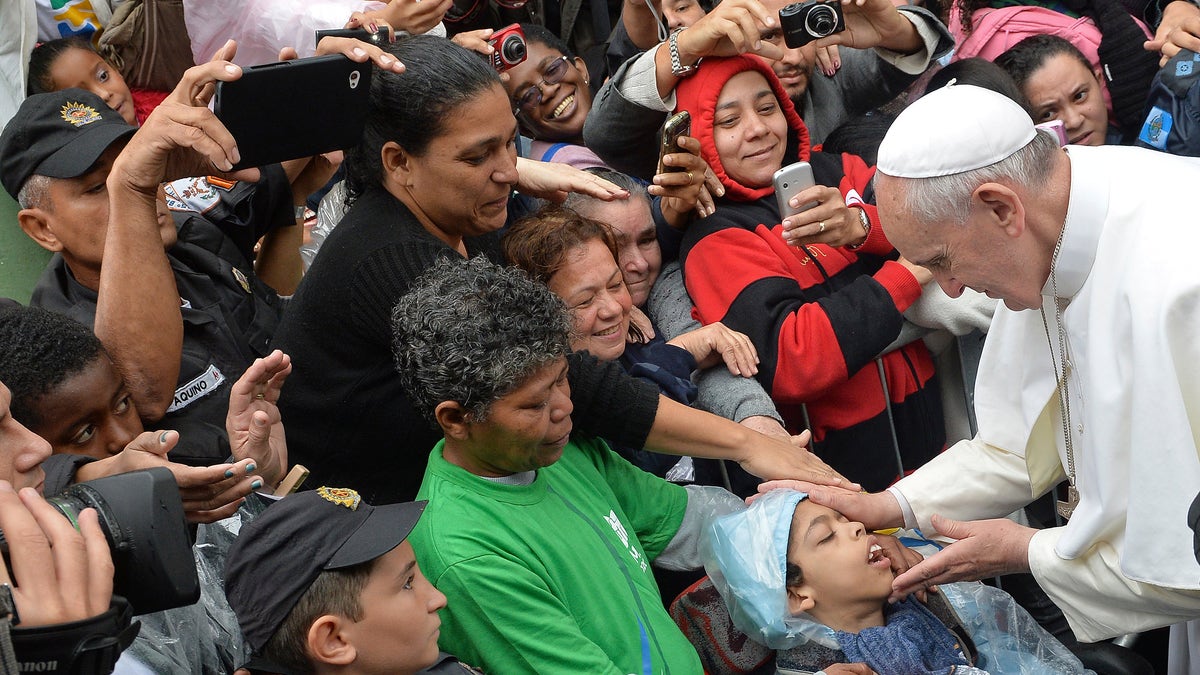
Pope Francis during his visit to the Varginha slum in Rio de Janeiro, Brazil, Thursday, July 25, 2013. (AP2013)
As Pope Francis and his advisors prepare for their trip to the United States this fall, are they concerned about the latest numbers confirming the continuing decline in Catholic affiliation in the U.S.? For every person who joins the Catholic Church, the Pew Research Center recently reported, six exit. If their data hold up, there are now more non-affiliates than there are self-identified Catholics in this country. What does this mean for the traction Francis might find during his visit?
[Pope Francis] can show the church that its opportunity today is to help people go deeper right where they are: Everyone has a next step to take in becoming more humane, and in taking that step each person goes further into tending life’s mystery.
If Pope Francis and all who aspire to his style of religious teaching can see this moment as new and rich with potential, and not only as a narrative of loss, the possibilities for the Catholic Church are fresh and important — for Catholicism and also for American religion.
Catholicism is caught up in cultural changes it did not invent and cannot control. Ongoing assimilation into the gifts and burdens of American life has left baptized Catholics, like Jews and mainline Protestants, in a breakdown of the sanctions that used to protect and license religious affiliation. The broad deference given to official Catholic assertions about privileged knowledge of divine things is in retreat — inside and outside the church. And the narrower space that is left for Catholic moral leadership amidst the church’s sex abuse scandal can only credibly be focused on making daily life better for the vulnerable and building humane bridges with religious and nonreligious “others.”
But this is freedom for the Church, not defeat.
Not even Pope Francis can reverse the trends changing the very nature of what it means to be religious, spiritual, and secular today. He seems to sense this freedom for a new mission in his talk of the church as a “field hospital,” attending to the wounded before presenting lessons on doctrine. However, if this means that non-affiliated persons are to be seen primarily as the sick to be cared for by the healthy, then the metaphor limps. It is more effective to speak to the strengths and creative capacities of those on the margins and out the door.
Francis is like the Dalai Lama or Archbishop Tutu, an inspiring global leader who is able to turn people inward and outward in ways that further personal integrity and social responsibility. He encourages many present and former Catholics alike. The teaching power of noble and courageous example is ultimately more important than who is Catholic and who is not. The difference such religious leadership can make exceeds the matter of religious affiliation as such. It inspires many people to be better in whatever affiliation or non-affiliation they have chosen. This is a clue to the Catholic Church’s new freedom in the USA, and what Francis can accomplish in his visit this fall.
The Catholic Church in the U.S. on the whole, like its heritage institutions such as hospitals and universities, tolerates a relatively wide range of beliefs and practices. This is why censorious bishops are still the exception and not the norm, and why theologians are generally unsurprised by widespread Catholic endorsement of sexual diversity, cohabitation, contraception, married priests, and women’s full equality in all church positions. Catholic pastoral leaders and theologians are well aware that baptized Catholics go their own way, dramatic public pronouncements notwithstanding.
Indeed, Francis’ gentle public manner and reticence about moralizing encourages a view of the disaffiliated—including those with a Catholic heritage—not as victims of secular culture, but as agents of potential new forms of spiritual life today. Indeed, despite the “field hospital” metaphor, Francis’ humble example leaves room for imagining theology and ministry as more focused on the reasons people make meaningful lives in contemporary culture. The strong diversity of good ways of life today are not reducible to any single account of ultimate reality. This is the mystery that many religious traditions, including Catholicism, are learning to face.
Francis can help the Catholic Church in the U.S. discover the freedom for a new mission, one that transcends the urge to sort people into “in” and “out.” He can show the church that its opportunity today is to help people go deeper right where they are: Everyone has a next step to take in becoming more humane, and in taking that step each person goes further into tending life’s mystery.
This does not ignore the deep problems of justice within the Catholic Church, which are serious and well-known. But Francis is one of the few world teachers who can credibly portray the noble life-work that the affiliated and the non-affiliated have in common: the privilege of saying yes to life and of helping to make that yes more possible for others. And Francis’ leadership is evidence that such a “yes” to the most vulnerable will slowly re-make the church itself. But in the end even that is not the most important thing.
